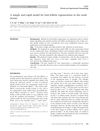 8 citations,
January 2015 in “Clinical and Experimental Dermatology”
8 citations,
January 2015 in “Clinical and Experimental Dermatology” A new model for hair regeneration in mice was created in 2015, which is faster and less invasive than the old method, producing normal hairs in about 21 days.
7 citations,
May 1979 in “Medical & biological engineering & computing” The trichometer accurately measures hair growth and is easy to use.
2 citations,
January 2021 in “Journal of The American Academy of Dermatology” A simple scalp scraping can effectively distinguish fibrosing alopecia from androgenetic alopecia with seborrheic dermatitis.
 November 2020 in “Journal of Pharmaceutical Sciences”
November 2020 in “Journal of Pharmaceutical Sciences” The decision tree can predict drug absorption issues with good accuracy but needs more validation and adjustments for other factors.
 January 2020 in “International Journal of Medical Research and Health Sciences”
January 2020 in “International Journal of Medical Research and Health Sciences” Many female students at Northern Border University in Saudi Arabia may have Polycystic ovary syndrome (PCOS) and related emotional distress, so those at risk should get further tests and treatment.
January 2014 in “European Journal of Dermatology” A method was found to visualize hair regrowth and avoid unnecessary side effects from treatments.
 May 2012 in “Faculty Opinions – Post-Publication Peer Review of the Biomedical Literature”
May 2012 in “Faculty Opinions – Post-Publication Peer Review of the Biomedical Literature” A simple method using the wash test and dermatoscopy can help differentiate between two hair loss conditions, androgenetic alopecia and chronic telogen effluvium.
 August 2006 in “Faculty Opinions – Post-Publication Peer Review of the Biomedical Literature”
August 2006 in “Faculty Opinions – Post-Publication Peer Review of the Biomedical Literature” A simple wash test can help differentiate between two types of hair loss, and dermatoscopy should be used for further clarification.
 June 2006 in “Faculty Opinions – Post-Publication Peer Review of the Biomedical Literature”
June 2006 in “Faculty Opinions – Post-Publication Peer Review of the Biomedical Literature” A simple method using the wash test and dermatoscopy can help differentiate between two hair loss conditions, androgenetic alopecia and chronic telogen effluvium.
 21 citations,
January 2016 in “Skin appendage disorders”
21 citations,
January 2016 in “Skin appendage disorders” Alfredo Rebora suggested a new, easier way to classify hair loss in Telogen Effluvium, adding a type possibly related to autoimmune diseases.







